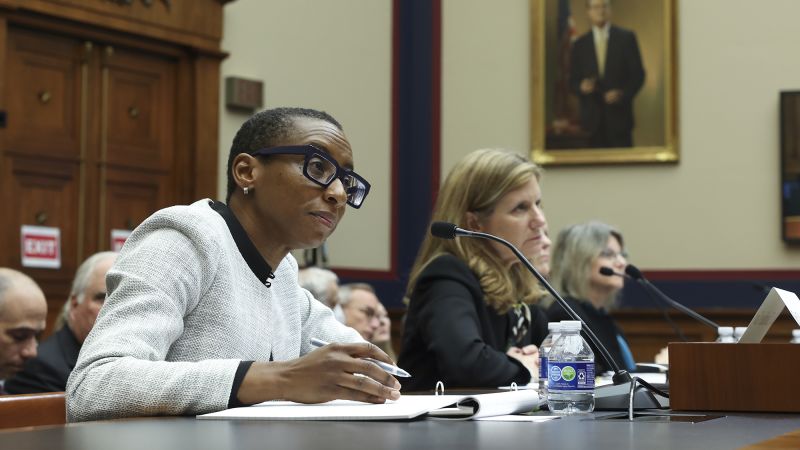Claudine Gay, Harvard University’s embattled president, has faced a flurry of criticism over her handling of alleged antisemitism at one of the nation’s most prestigious universities. But her position is more secure than her University of Pennsylvania counterpart Liz Magill, who resigned on Saturday.
Calls for Gay’s removal following her testimony before Congress last Tuesday, where she, Magill, and MIT’s president Sally Kornbluth failed to explicitly state whether calling for the genocide of Jews would necessarily violate their code of conduct, have been tempered by the support of hundreds of Harvard faculty members.
Institutional support and trust carry a lot of weight for university presidents. Last week, the Executive Committee of the MIT Corporation released a statement affirming their “full and unreserved support” of Kornbluth, saying that “she has done excellent work in leading our community, including in addressing antisemitism, Islamophobia, and other forms of hate, all of which we reject utterly at MIT.”
While Harvard’s board of directors met Sunday for a regularly scheduled meeting, they have not yet released a statement backing Gay and have remained mum about her fate as they meet Monday. But Gay still has more vocal support than Magill did. More than 650 Harvard faculty members have signed a petition urging school officials to resist calls for Gay’s removal. According to the 2023 Harvard annual report, the university has 1,068 tenured faculty plus 403 tenure-track faculty.
“We, the undersigned faculty, urge you in the strongest possible terms to defend the independence of the university and to resist political pressures that are at odds with Harvard’s commitment to academic freedom, including calls for the removal of President Claudine Gay,” the petition said. “The critical work of defending a culture of free inquiry in our diverse community cannot proceed if we let its shape be dictated by outside forces.”
Unlike Gay, Magill was under fire for months prior to her resignation. In September, the university allowed speakers that Penn’s administration acknowledged had a history of making antisemitic remarks to participate in the “Palestine Writes Literature Festival” on campus.
While Magill and other university administrators released a statement condemning antisemitism, they added that, “as a university, we also fiercely support the free exchange of ideas as central to our educational mission. This includes the expression of views that are controversial and even those that are incompatible with our institutional values.”
Many donors found the response tepid and had been calling for Magill’s removal since, with the existing tensions becoming further inflamed once the current Israel-Hamas war began.
Gay opened a dialogue and apologized
Gay has been vocal in her acknowledgement of Jewish students’ concerns.
On October 7, a coalition of student groups released a statement placing the blame for Hamas’ attacks on Israel’s government. The letter drew sweeping condemnation from business leaders and alumni, who called for the students whose groups signed the statement to be blacklisted. A spokesperson for the coalition later wrote in a statement that the group “staunchly opposes violence against civilians — Palestinian, Israeli, or other.”
Three days after the coalition posted its letter, Gay released a statement condemning the “terrorist atrocities perpetrated by Hamas” and affirming that “no student group — not even 30 student groups — speaks for Harvard University or its leadership.”
In a speech at Harvard’s Jewish student organization in late October, Gay announced that she had assembled an advisory group of “faculty, staff, alumni, and religious leaders from the Jewish community” who “will help us to think expansively and concretely about all the ways that antisemitism shows up on our campus and in our campus culture.”
Yale University President Peter Salovey has followed in her footsteps, announcing last week that the school is setting up a committee to “identify and address issues related to campus climate for the Jewish student community.” Yale is also expanding a committee that addresses anti-Arab attitudes and Islamophobia on campus, which “will conduct cross-sectional work with the new committee on Jewish student life.”
Crucially, Gay also outright apologized following her testimony last week.
“I am sorry,” she said in an interview with The Harvard Crimson published on Thursday. “Words matter.”
“I got caught up in what had become at that point, an extended, combative exchange about policies and procedures,” Gay told the student newspaper. “What I should have had the presence of mind to do in that moment was return to my guiding truth, which is that calls for violence against our Jewish community — threats to our Jewish students — have no place at Harvard, and will never go unchallenged.”
That has not made Gay less susceptible to criticism, but her willingness to take accountability in the face of criticism may be the determining factor in whether she ultimately steps down.
A number of government officials, donors and other prominent leaders are still calling for Gay to step down over her perceived inaction in combatting antisemitism on campus.
“One down. Two to go,” Republican Rep. Elise Stefanik of New York wrote on X, formerly known as Twitter after Magill stepped down, with “two” being a reference to Gay and Kornbluth. “In the case of @Harvard, President Gay was asked by me 17x whether calling for the genocide of Jews violates Harvard’s code of conduct. She spoke her truth 17x. And the world heard.”
Stefanik, along with a group of 71 bipartisan lawmakers, sent a letter to the governing boards of Harvard, Penn, and MIT last week urging them to remove their university leaders.
Billionaire hedge fund CEO Bill Ackman, a Harvard graduate, has been among Gay’s most vocal critics. In an letter to Harvard’s board on Sunday Ackman wrote that Gay, who was inaugurated in July, “has done more damage to the reputation of Harvard University than any individual in our nearly 500-year history.”
Ackman has also questioned Gay’s academic integrity and values, posting on social media content that implies Gay, who is the first Black woman to lead Harvard, was hired to fulfill diversity metrics. In his letter, he attacked Harvard’s diversity, equity and inclusion practices as a “major contributing source of discriminatory practices on campus.” Ackman’s strategy of criticizing antisemitism and inclusion efforts for protected groups in the same breath may undermine his pressure campaign against Gay.
Criticism of Gay from Harvard’s community has largely framed discrimination on campus as a systemic issue, not a moral failing on her part. In the statement last week announcing his resignation from Harvard’s antisemitism advisory group following Gay’s testimony, Rabbi David Wolpe said that combatting the combination of ideologies at Harvard that frame Jews as oppressors while “belittling and denying the Jewish experience … is the work of more than a committee or a single university.”
“It is not going to be changed by hiring or firing a single person,” he wrote, after emphasizing that he believes Gay is “both a kind and thoughtful person.”
Alumni donors — more than 2,000 of whom signed an open letter to Gay and Dean of Harvard College Rakesh Khurana — rather than calling for Gay’s resignation, have asked for concrete reforms to support Jews on campus and have warned that they would withdraw their donations if those steps were not taken.
Read the full article here




